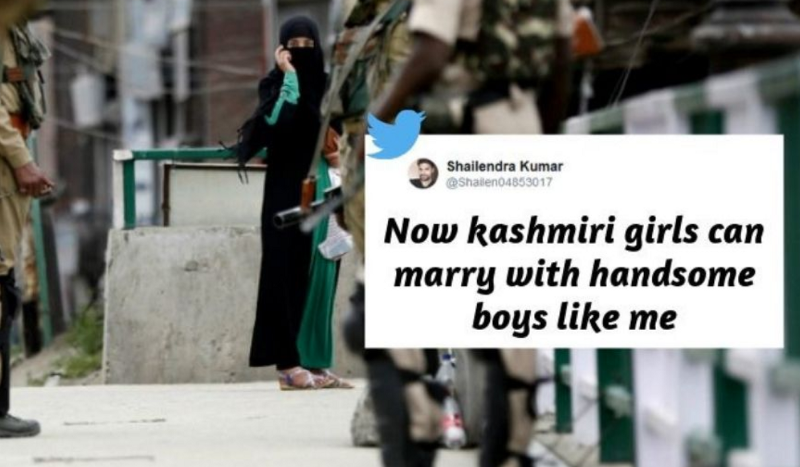Are women, LGBTQ+ in Kashmir better off since India’s revoking of Article 370?

The major claim by supporters of the decision to strip Kashmir of its semi-autonomous status by revoking Article 370: Now Kashmiris will be able to enjoy full and equal rights under the Indian constitution, something they were deprived of under Article 370.
That point of view is defended by three main talking points (below). We break down those talking points here and explain why they don’t stand up to reality.
Talking Point 1: Revoking Article 370 will mean LGBTQ + Kashmiris will be fully protected under the Indian Supreme Court, which decriminalized homosexuality in 2018. Repealing Article 370370 was necessary to extend the Court’s decision to LGBTQ+ Kashmiris and ensure they are protected.
Response:
- The Indian Supreme Court’s decision in 2018 extends to ALL state High Courts, including the High Court of Jammu and Kashmir. There is no special law under Jammu and Kashmir’s Constitution which otherwise criminalizes homosexuality. As a result, Article 370’s revocation does absolutely nothing legally to benefit LGBTQ+ Kashmiris.
- Following August 5th, Kashmir’s LGBTQ+ community has suffered tremendously. Beyond the communication blackout, curfew, and sustained state violence, Kashmir’s transgender community has been affected particularly hard by these restrictions. Transgender Kashmiris play an integral role in the marriage economy of the Valley, and because of these restrictions, they’ve been unable to earn an income for 60+ days.
Talking Point 2: Article 370 is repressive and did not give Kashmiri women equal rights because under 370, Kashmiri women were unable to own land and property in the state if they married a non-Kashmiri. Revoking Article 370 is therefore necessary to guarantee women’s equality under the law.
Response:
- In 2002, the Jammu and Kashmir High Court struck down this practice in State and others versus Dr Susheela Sawhney and others. Kashmiri women have had full equality under the law since this decision.
- There are reforms that are necessary to fully guarantee the property rights of children born to a Kashmiri mother and non-Kashmiri father. But these rights could have been granted through legislative reform or through the courts, not through Article 370’s revocation.
- Any conversation on “rights” of all Kashmiris or “equality”, must include their fundamental right to self-determination. A vision of a Kashmiri society that is egalitarian must also be free from occupation.
Talking Point 3: Under Islamic Law, men can divorce women by merely uttering “Talaq” three times (“Triple Talaq”) and completely remove any social or financial obligation to their wife. This practice has been outlawed in India, and revoking Article 370 is necessary to apply this revocation to protect women in Kashmir.
Response:
- In 2012, the Jammu and Kashmir High Court in the case of Mohammed Naseem Bhat vs. Bilquees Akhter ruled that a husband does not have “absolute and unqualified power to pronounce divorce” on his wife. This case explicitly held that a Kashmiri man cannot divorce his wife in an instant, and must undergo an extensive process to protect the interests of the wife.
- While there has been some question as to whether the High Court’s decision in 2014 of Masrat Begum vs. Abdul Rashid Khan may have reinstated that right, there is no indication that instant divorce occurs in Kashmir outside of particularly exceptional instances.
- Similar to the issue of land ownership for the children of Kashmiri women, revoking Article 370 to address marital issues in the state stands in direct contrast to the will of Kashmiri women. No Kashmiri women were consulted prior to this action, and Kashmiri feminists have consistently argued that the fundamental challenge to woman’s rights in Kashmir is the Indian occupation.
- The occupation has inhibited women’s rights to life, property, and security. It has resulted in gang rapes of Kashmiri women (including the infamous case of the villages of Kunan Poshpora), as well as cases of sexual violence and harassment by Indian forces. It has left thousands of women grieving for their killed or missing kin. Kashmiri women suffer from severe anxiety and depression as a result of the occupation.
©2025 StandWithKashmir All rights reserved. SWK is a 501(c)(3) non-for-profit organization.


Leave a Reply